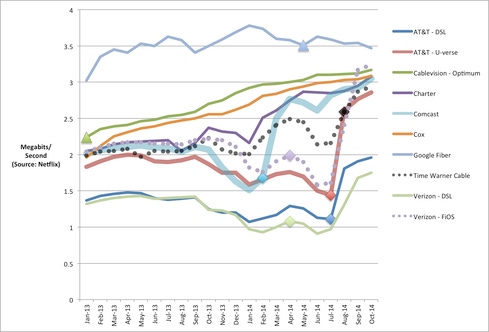Let's move past 1990s regulations and preconceived notions about net neutrality and focus on modern ways to prevent anti-competitive behavior.

the shenanigans that they used to get away with when they're always under such intense public scrutiny. It's in their best interests to toe the line.
Fact No. 3: Old practices don't lead to new solutions.
The current telecom regulatory environment is almost 20 years old. When the canonical Federal Telecommunications Act of 1996 was signed into law, Bill Clinton was still in office, Netscape Navigator was just released, Pentium processors ran at 200 MHz, and Apple was a company in crisis.
It was a really long time ago.
Net neutrality supporters are champing at the bit to classify broadband as a "Title II" utility service, bringing the Internet back to a 1996 regulatory environment. Those telecom regulations were created for a very different time. The World Wide Web was still an academic curiosity. There were no social media. Most folks didn't even have email, much less constantly connected, powerful computers in their pockets. There was no open data or big data, and certainly no automated web pages that showed how Internet service providers were affecting download speeds.
Could Title II regulation harm our robust Internet economy? Absolutely. How?
"Right now, a group like ours doesn't have to deal with a lot of regulatory paperwork," says Bradley Cain, president of ERC Broadband, a small, not-for-profit broadband provider in western North Carolina. "It could put some providers out of business."
Cain recalls a time earlier in his career when he was in management at the highly regulated Verizon. "We had to report out on literally dozens of different metrics on a monthly basis," he says. "If we didn't hit certain numbers, we were fined." Verizon could afford those fines, but "a small group trying to be a competitive influence in the marketplace will not be able to survive the reporting, the potential fines, or the pressure."
My InformationWeek colleague Tom Claburn, in his column on net neutrality last week, writes that once the Title II reclassification goes though, he hopes that "such data retention requirements will not come to pass." But onerous data gathering, reporting, and retention requirements are exactly what this type of regulation requires. Regulation is about reporting requirements, trying to avert fines, and needing to hire lawyers and more administrators to deal with it all. Cain isn't optimistic that small providers can afford such regulatory requirements. Aren't those small providers the ones we want to encourage?
Instead of asking service providers to let the Internet be "free" and still somehow make enough money for necessary capital investments, let's look at what's working to prevent anti-competitive behavior, and let's do more of that. Above all, we must make sure that smaller providers don't get plowed over as we try to "level the playing field." The Netflix and Google (with YouTube) technique of publicizing ISP performance is a good start. The FCC should focus more on that type of thing, using modern measurement tools to prove anti-competitive behavior where it exists, instead of overly broad 1990s-style regulations and their onerous reporting requirements that choke small providers and reduce needed competition.
As we pull out of a difficult time in our nation's financial history, government agencies struggle to meet information technology demands. Agencies must focus on the cloud and a strong information governance program to avoid the sort of attention recently focused on the IRS. Get the Time To Reconsider Enterprise Email Strategy report from InformationWeek Government today (free registration required).
About the Author(s)
You May Also Like







